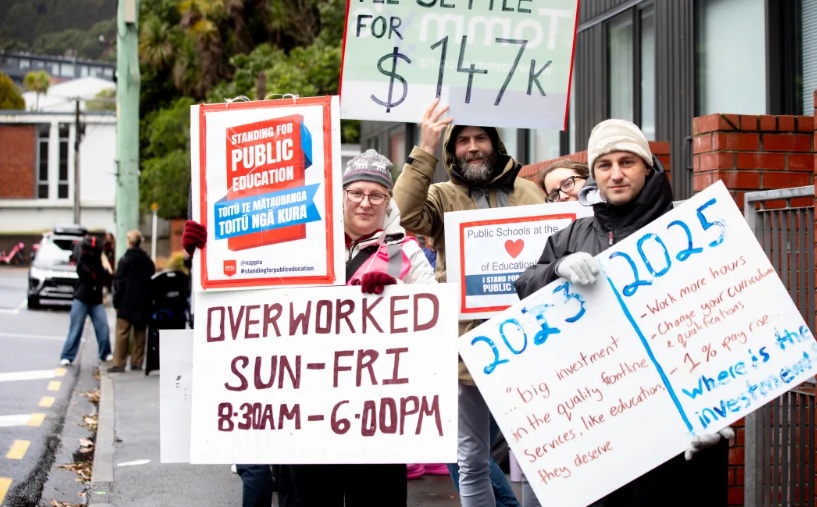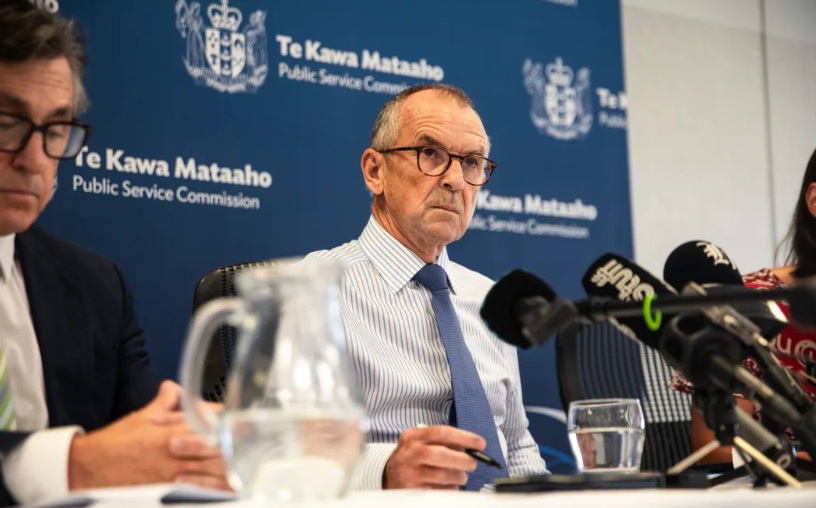
A primary teachers strike will cause disruption to parents and students at a time when they need stability, Public Service Commissioner Sir Brian Roche says.
About 40,000 primary school teachers, principals, and support staff will walk off the job on October 23.
The decision comes amid rolling strikes by secondary school teachers this week.
Sir Brian said other strikes going ahead now and in the month ahead for secondary teachers and senior doctors reflected a "volatile industrial environment".
The vote to strike came after the union rejected the latest pay offer. Teachers were offered a 1.43% to 2.52% pay increase in the first year and between 1.3% and 2.1% in the second year, the Education Institute (NZEI) said.
Sir Brian Roche said the offer was fair and fiscally responsible.
"It builds on some significant increasing in recent years, and it's also on top of a $2.5 billion investment in education.
"For the union to say there hasn't been an investment in education is just misleading."
Education Institute negotiator Liam Rutherford said the vote showed the depth of feeling among members who were struggling without the support or resources they needed to meet students' increasingly complex needs.
People want to see support in their classrooms tomorrow to meet the needs of young people," he said.
Sir Brian said he was open to accommodating some of the union's concerns, but wanted to see a counter-offer from the union first so the parties could get around the negotiating table.
"I am always open to look at anything, but we have been very clear to the union, that we have an envelope - we've made that very clear.

Secondary school teachers have embarked on a partial strike this week, and senior doctors will strike on September 23 and 24. Nurses went on strike earlier this month.
Sir Brian said this reflected a "volatile industrial environment".
"I'm dealing with a number of unions, they are all looking to go on strike at some point as a first line of defence. I respect the fact they have the right to go on a strike, but I don't respect that it can often be done without the due regard to the disruption that it causes to others."
He said the primary school teachers strike was coming at a "really difficult time in the education year".
"We are approaching school holidays. We need to provide stability and certainty for the students and the parents, strikes don't do that."
Rutherford said union members wanted to be in a profession where staffrooms didn't discuss pay in Australia.
"We actually want a profession where people can stay and have really long and successful careers, whether they're support staff, principals, teachers, or working for ministry learning support."
He said the union was open to negotiating an offer that would bring industrial action to an end.
"But also, people don't just want an offer for the sake of an offer. They actually want confidence that it's going to deal with the issues going on in the sector."
The Ministry for Education has also been approached for comment.
Meanwhile, the Post-Primary Teachers' Association president Chris Abercrombie said striking teachers felt they were "putting in the work to try and get the government to move the needle on negotiations".
The secondary school union's members voted to begin rolling strikes, targeting different year groups each day this week.
Abercrombie said there had been some discussion this week about setting a date for bargaining, but nothing was locked in.
He hoped the upcoming school holidays would be the necessary "circuit-breaker" to return to negotiating and reach a settlement.
"We are always open to discussions. When you say, 'counter-offer' and 'offer' it sounds like you're trying to buy a car, you're just saying numbers to each other - and it's not as simple as that."
Abercrombie said the government and teachers shared the same goal of having a "world-class education system", but more money was needed to deliver it.
"I think the government is probably going to have to put a bit more in the envelope."













